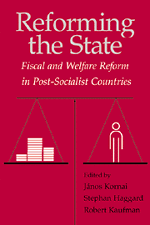Book contents
- Frontmatter
- Contents
- List of Tables and Figures
- List of Contributors
- Preface
- Introduction
- Part I Fiscal Policy and Institutions
- 1 The Politics of Labor-Market Adjustment: The Case of Russia
- 2 Creating Effective Tax Administrations: The Experience of Russia and Georgia
- 3 Politics, Institutions, and Macroeconomic Adjustment: Hungarian Fiscal Policy Making in Comparative Perspective
- 4 Brothers-in-Arms or Rivals in Politics? Top Politicians and Top Policy Makers in the Hungarian Transformation
- Part II The Welfare State
- Appendix
- Index
1 - The Politics of Labor-Market Adjustment: The Case of Russia
Published online by Cambridge University Press: 05 June 2012
- Frontmatter
- Contents
- List of Tables and Figures
- List of Contributors
- Preface
- Introduction
- Part I Fiscal Policy and Institutions
- 1 The Politics of Labor-Market Adjustment: The Case of Russia
- 2 Creating Effective Tax Administrations: The Experience of Russia and Georgia
- 3 Politics, Institutions, and Macroeconomic Adjustment: Hungarian Fiscal Policy Making in Comparative Perspective
- 4 Brothers-in-Arms or Rivals in Politics? Top Politicians and Top Policy Makers in the Hungarian Transformation
- Part II The Welfare State
- Appendix
- Index
Summary
By mediating the impact of macroeconomic stabilization and fiscal adjustment on the everyday life of the population, labor markets play an important role in determining the success of the transition to the market. After seven years of transition, however, the Russian labor market still seems to be performing quite differently from the labor markets in other transition countries. Hungary and Poland faced sharp declines in employment early in the transition. Unemployment rates there remain quite high even now, after several subsequent years of economic growth. The Czech Republic has little unemployment, but this must be set against slow economic restructuring and continuing government support to ailing enterprises.
In Russia, a large increase in unemployment had been widely expected even before the reform started. Nevertheless, open unemployment remained rather low until 1995, despite a 50 percent decline in production. In Russia, the standard trade-off between employment and wages was transformed into one between unemployment and underpayment with wage arrears. In 1996–98 wage arrears or significant delays in wage payments became one of the salient features of Russian economic and political development. They contributed heavily to rapidly growing public debt, thus eroding fiscal policy and generating even more political and economic uncertainty. To this extent, they became one of the determinants of the 1998 financial crisis.
Why does the “Russian way” of labor-market adjustment (as it was described first by Layard and Richter 1994) deviate so much from that in most of the other reforming countries? There is a number of interdependent reasons.
- Type
- Chapter
- Information
- Reforming the StateFiscal and Welfare Reform in Post-Socialist Countries, pp. 25 - 52Publisher: Cambridge University PressPrint publication year: 2001
- 8
- Cited by



